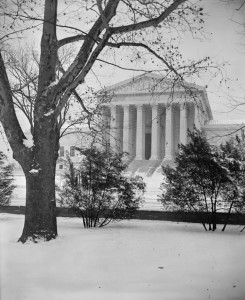De Jonge v. Oregon: The Right to Peaceable Assemble

In De Jonge v. Oregon, the U.S. Supreme Court confirmed that the right to peaceable assembly is equally as important as the freedom of speech and the freedom of the press. The decision also highlights that the right to engage in political discussion must be protected even when the government disagrees with the message.
Under the First Amendment, the government cannot abridge “the right of the people peaceably to assemble.” So long as they remain non-violent, protestors are free to gather and speak their minds.
The Facts of the Case De Jonge v. Oregon
In 1936, the state of Oregon enforced a “criminal syndicalism” law, which prohibited advocacy of “any unlawful acts or methods as a means of accomplishing or effecting industrial or political change or revolution.” Dirk De Jonge was indicted under the law for assisting in the organization of a meeting that was called under the auspices of the Communist Party, an organization deemed to advocate criminal syndicalism.
In his defense, De Jonge argued that the meeting was public and orderly and was held for a lawful purpose. He further maintained that while the Communist Party called the meeting, neither criminal syndicalism nor any unlawful conduct was taught or advocated at the meeting by him or anyone else. He was ultimately found guilty as charged and was sentenced to imprisonment for seven years.
The Supreme Court’s Decision
The U.S. Supreme Court struck down the Oregon law and reversed his conviction, finding that “the holding of meetings for peaceable political action cannot be proscribed.”
In reaching its decision, the Court noted, “Freedom of speech and of the press are fundamental rights which are safeguarded by the due process clause of the Fourteenth Amendment of the Federal Constitution… The right of peaceable assembly is a right cognate to those of free speech and free press and is equally fundamental.”
The Court acknowledged that First Amendment rights may be abused by using speech or press or assembly in order to incite to violence and crime and that the government may pass laws to protect themselves against that abuse. However, it also highlighted that “the rights themselves must not be curtailed.”
“The greater the importance of safeguarding the community from incitements to the overthrow of our institutions by force and violence, the more imperative is the need to preserve inviolate the constitutional rights of free speech, free press and free assembly in order to maintain the opportunity for free political discussion, to the end that government may be responsive to the will of the people and that changes, if desired, may be obtained by peaceful means. Therein lies the security of the Republic, the very foundation of constitutional government,” the Court explained.
Previous Articles
SCOTUS Wraps Up Oral Arguments for the Term
by DONALD SCARINCI on May 17, 2022
The U.S. Supreme Court has concluded its oral arguments for the October 2021 Term. The justices hea...
SCOTUS Rules Censure of Elected Board Member Didn’t Violate First Amendment
by DONALD SCARINCI on May 10, 2022
In Houston Community College System v. Wilson, 595 U.S. ____ (2022), the U.S. Supreme Court held th...
Supreme Court Breach Is Not the First Involving Roe v. Wade
by DONALD SCARINCI on
The recent disclosure of Justice Samuel Alito’s decision purporting to overturn Roe v. Wade is ar...
The Amendments
-
Amendment1
- Establishment ClauseFree Exercise Clause
- Freedom of Speech
- Freedoms of Press
- Freedom of Assembly, and Petitition
-
Amendment2
- The Right to Bear Arms
-
Amendment4
- Unreasonable Searches and Seizures
-
Amendment5
- Due Process
- Eminent Domain
- Rights of Criminal Defendants
Preamble to the Bill of Rights
Congress of the United States begun and held at the City of New-York, on Wednesday the fourth of March, one thousand seven hundred and eighty nine.
THE Conventions of a number of the States, having at the time of their adopting the Constitution, expressed a desire, in order to prevent misconstruction or abuse of its powers, that further declaratory and restrictive clauses should be added: And as extending the ground of public confidence in the Government, will best ensure the beneficent ends of its institution.




